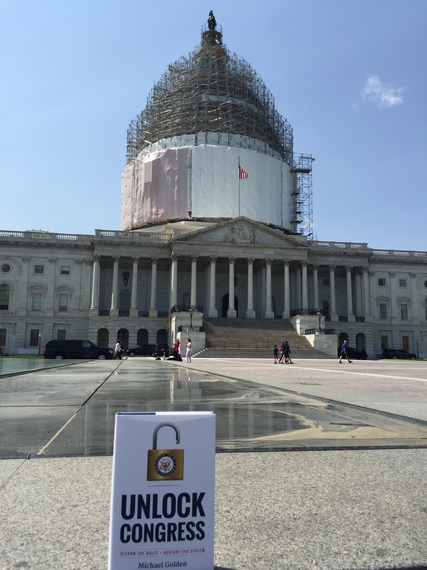
Carly Fiorina, the clear winner of the first GOP debate according to public opinion, happily distilled afterwards the theme she skillfully rode to victory:
"People are sick of politicians. Every election cycle we hear these great ideas for what we're going to do -- and somehow they just never happen."
Fiorina was the only candidate standing atop the stage of seven who had never held elective office before (just as Donald Trump and Ben Carson were for the evening debate). Her outsider status most certainly helped her anti-Washington message to resonate in a more authentic fashion.
And it's a ripe audience. A great many Americans who are fed up and angry with the status quo say they want something different. We've seen this show for years, it just seems to get worse every four. And so every campaign cycle, just about every candidate works to convince voters that they're the savior best qualified to shake up the system. But no matter who is uttering the guarantee, it remains a dubious claim.
Set aside political party for a moment. Americans who tuned in to the two primary debates heard dozens of promises -- clear vows of what each candidate would do, and why out of 17 individuals, they'd be the surefire bet to get it all done.
What Americans didn't hear was a single reference, explanation or solution regarding the biggest problem in D.C. -- Congress. It's almost as if the candidates conceptualize the occupation of the Oval Office as being a completely omnipotent position where with a snap of the fingers one can instantly control all gears of government. Everything can be "fixed" or "straightened out" just as soon as the executive branch is turned over to someone who really knows how to "get things done." Separation of powers? Spare us.
Of course, televised political debates are not really debates in the traditional sense. Nowadays, a presidential debate is the ultimate chess game of sound bites. And as the candidate count climbs on the podium, each individual is afforded less time to speak, thus less time to explain anything. As someone who's coached a few candidates through debate prep, I know this game all too well. The strategy is to say what you want to say. Get your message across. Don't provide or get mired down in the details. Stand out, seem competent, and capture the next day's print headlines and broadcast A-blocks.
But the reality is that even if a voter's all-time favorite president -- of either political stripe -- could be magically returned to the White House today, that leader would still be required to work with a legislative branch that in its most recent full session registered a 7 percent public confidence rating (the worst in the 40 years Gallup's been asking the question). Party control may have changed seven months ago, but our approval rating of Congress continues to sit at a dismal level. It's no wonder why. Where is the overhaul of our rigged tax system we hear about every election campaign? Where's the long-term planning and funding of our crumbling infrastructure and transportation systems? Wage growth for U.S. workers? Lower prices for prescription drugs? Immigration reform? The list is long.
Once issues start coming up, political parties start pointing fingers. But this problem stretches far beyond party. The candidates on each side of the aisle, for example, will attempt to saddle the other side with responsibility for our national immigration mess. They're depending on our short memories. The fact is that we've had two consecutive presidents, from opposing parties, each elected to serve for eight years, who have tried and been unable to pass comprehensive immigration reform. And the last time an administration successfully worked with Congress to do so, it was three decades ago.
It's not so difficult for candidates to colorfully describe our nation's problems, propose big picture solutions, and then confidently claim that their unique brand of leadership will make it all happen ("straight talk" from CEOs is the latest zeitgeist). But when it gets down to the actual task of governing in our system -- trying to negotiate and move the wheels of a highly dysfunctional U.S. Congress in a specific direction -- that's the hard part.
All of the Washington outsiders rip on the insiders -- those "incompetent" incumbents on Capitol Hill (and even they try to position themselves as outsiders these days). But are the people really the problem? Are all 535 of our elected officials in Congress incompetent? Mathematically, it's an illogical assertion. Perhaps it's the rules in the system that keep leading to poor outcomes. Perhaps it's time to focus the lens beyond just the parties and personalities, and zoom in on the incentives that may be driving a good portion of the behavior.
These early debates comprise only the first leg of what will be a rhetorical marathon in what has become a comically protracted presidential campaign cycle. It's not likely that the candidates on either side of the aisle will voluntarily broach the process story of our defective Congress and what to do about it. But if we as an electorate want our next president to achieve more of the common sense solutions that majorities of us are in favor of, we had better push them all to explain just exactly how they're going to move -- or reform -- the essential legislative lever in our federal government. As Fiorina summed up in that same post-debate interview: "Politicians respond to pressure."

